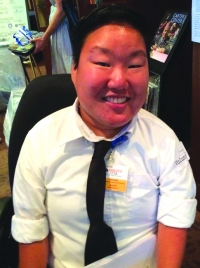STRAIGHT TALK: Leading an Independent Life Because of the ADA
 Sukhwa Glick, 26, Atlanta, GA resident, part-time employee and aspiring photographer.
Sukhwa Glick, 26, Atlanta, GA resident, part-time employee and aspiring photographer.
Do any of those labels indicate that I am a person with a disability? No? Well, I am. And I am glad that they do not imply that because my disability isn't who I am, but a part of me.
On August 11, 1988 in South Korea, I was born with a disability known as Arthrogryposis Multiplex Congenita (a physical disability that affects all four of my extremities.) Six months later, I was adopted and living in the United States in a small town in Connecticut and I graduated from high school in Florida.
And today, I am in Atlanta working and leading the most independent life that was only imaginable years ago.
My current level of independence, and that which I have experienced in the past, would not be possible without the Americans with Disabilities Act (ADA) protecting my rights as a person with a disability. I live alone in my own apartment, coordinate my own personal care attendant's schedule and have an active social life. Graduating high school with the standard diploma alongside my peers, who I had grown up with since the beginning of our educational careers, would not have been as equal of an opportunity without the
ADA and the Individuals with Disabilities Education Act (IDEA).
Nor would graduating with a college degree [of my choosing] have felt like such an equal playing field amongst my peers without disabilities. However, my rights to the least restrictive educational environment are not the only ones included in the ADA. Being able to acquire and sustain reliable transportation, employment and housing – being self-sufficient and gainfully employed – are goals that almost everyone sets for himself or herself.
But it is "easier" to attain for some rather than others. Fortunately, I have been given the access and knowledge to the resources that I need, to personally overcome those obstacles. In conjunction with the ADA, I have been graced with the presence of a great network of support – family and friends. Knowing what the ADA protects and how to self-advocate is the key to this "ease." The ADA is a great foundation for eliminating discrimination against people with disabilities in prime aspects of life.
I speak from experience. But there are very few things that are "perfect" in this world. For the most part, there is room for improvement. The change that I would like to see and contribute to the disability community is to open more doors for equal opportunities. If every part of living in the community was more universally accessible, employment statistics would improve, inclusion would be second nature, and the quality of life for all would no longer be a concern to be resolved.
With the advances in technology and education systems, if we included the disability movement and history into curriculums, this task will not seem so difficult.Until then, for me, promoting the independent living philosophy and sharing the knowledge that I have to empower the emerging advocates, will continue to be my goal.
SUKHWA GLICK is the youth outreach and development specialist with disABILITY LINK and The Center for Independent Living that serves 12 counties in Metro Atlanta. She is also a part of the Association of Programs for Rural Independent Living's (APRIL) Youth Steering Committee.
Tags: Making a Difference, Straight Talk
